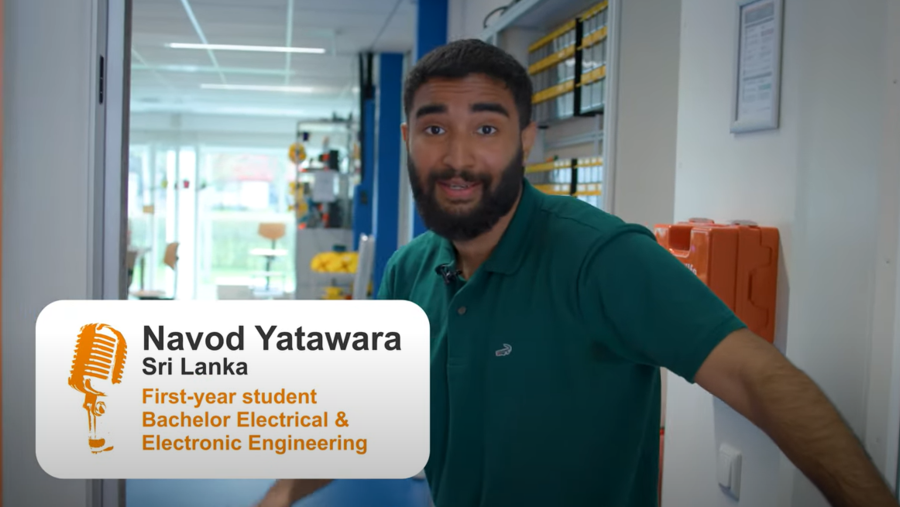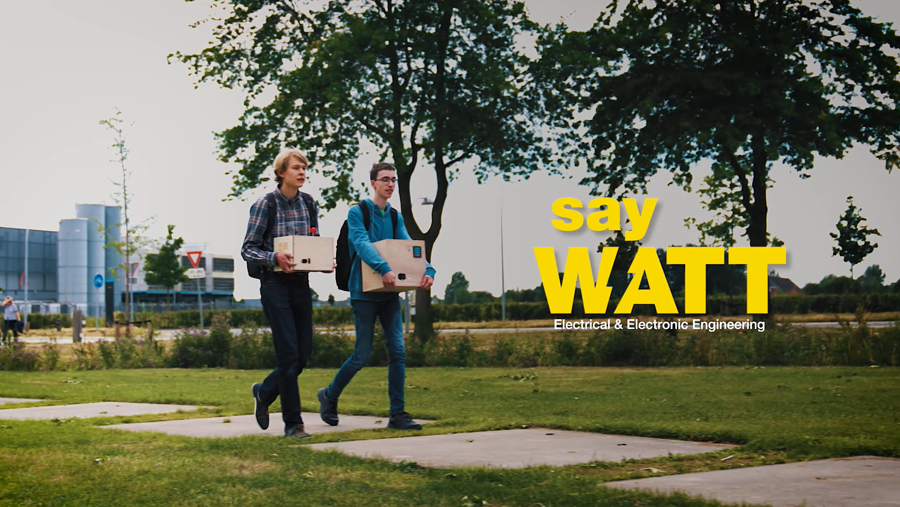Learn to understand and make all moving parts in engineering
Check whether you qualify- Bachelor
- Full-time
- 4 years
Learn to understand and make all moving parts in engineering
Check whether you qualify
Will you design and build a robotic arm that will pave the way for new surgery methods? Will your drone improve firefighters' safety at work? Or will you design the drivetrain and electric engine for a solar-powered car? With the Mechatronics major of the Electrical Engineering programme, you will set the world in motion. This is what you will find with us:
✔ Programme developed jointly with the business community ✔Passionate, driven groups ✔ Great job prospects
You have a lot of choice within our Electrical Engineering programme. In the first two years you can add your own flavour to your studies by choosing a number of elective subjects, and you lay the foundation for your specialisation in your third year. In addition to the Mechatronics specialisation, you can also opt for an Energy & Power Electronics or a Sensors & Smart Systems specialisation. Whether you want to work with moving systems, technology for the energy transition, or smart electronics – you will find the programme at Hanze!
What makes studying at Hanze UAS unique is that you will work on projects for real clients and contribute to concrete solutions for current issues impacting society. Below, you can find some examples of projects our students engage in.
The Mechatronics specialisation is one of the three specialisations of the Electrical Engineering programme. From a fully automated production line to a robot who assists a surgeon in the operating theatre: mechatronics is everywhere. The Mechatronics specialisation focuses on the design and control of mechanical systems. It’s the ultimate combination of mechanical engineering, electrical engineering and information technology. Will you become an expert in industrial robotics or PLC control and come up with the ultimate design?
During your programme, you will develop knowledge and skills in everything in the field of electrical engineering. For example, you will work on robotics, programming, control systems and data communication. You will immediately start working on assignments from real clients in the field and have plenty of room to organise your own studies.


You will be introduced to the versatile, fascinating and broad world of electrical engineering. You do this with all new Electrical Engineering students. You will learn to design, build and program analog and digital electronics. In the meantime, you will lay a solid foundation in the mathematics and physics needed to understand electrical engineering. Of course, you will apply everything you have learnt in projects with your fellow students - such as building an electronic game or a robot. With electives such as sustainable energy technology or applied mechanics, you can discover which specialisation you like best.
If you discover during your first or second year that you prefer a different direction of Electrical Engineering (Sensors & Smart Systems or Energy & Power Electronics), it's not a problem. You can just switch!
Here you will continue to lay a broad foundation in electrical engineering. But now no longer with separate courses, but in four periods, where everything you learn in each period comes together in a project. You will work on building your own control system, creating a dashboard for a customer in which you will show live, remotely measured data and creating an improvement plan for a drive system.
To conclude and highlight the year, you will design and build your own robot. But this time you will approach it from your own specialisation. You can choose whether you want to focus on designing a PCB or on choosing the right sensors and processing the data provided by the sensor or if you will focus on all the moving parts needed to be able to move forward and pick up blocks (packages).
In years 3 and 4 you will have a lot of freedom, because you can determine the order of the following parts of your programme yourself:
Internship
You will work for a company of your choice, in the Netherlands or abroad, for six months to put all the knowledge and skills you have acquired into practice. You will do this by working on your own assignment under the supervision of a supervisor from your internship company.
Specialisation
You will work on the specialisation of your choice for six months. You can choose between Energy & Power Electronics, Sensors & Smart Systems or Mechatronics. Here you will acquire the specialisation that prepares you for the field of electrical engineering in which you are interested.
Free Elective Space
Here you can go wild and do what you like. You could follow six months of education abroad, or at another university of applied science in the Netherlands, or at the Hanze. And for your free elective space, you can choose whatever topic you want to study. You could delve deeper into Electrical Engineering by doing a second specialisation, but you could also study a language abroad for six months.
You will graduate at the end of the fourth year. You will choose a company that has an interesting issue that you can turn into a graduation assignment. Next, you will conduct research for the company for six months and come up with an innovative, smart solution that will benefit the company. During your graduation, you will show that you are the independent professional that the field is so eagerly waiting for!
After your bachelor’s programme in Electrical and Electronic Engineering, you can continue your studies by doing a master’s programme to obtain a Master of Science degree. As an example, you can pursue a follow-on master’s programme at Hanze UAS, such as our master’s programme in Smart Systems Engineering. You can also continue your studies at a university, such as the University of Groningen.
Electrical and Electronic Engineering graduates who choose to study further often choose the following degree programmes:
On completion of the bachelor’s programme in Electrical and Electronic Engineering, you will be awarded the degree of Bachelor of Science, which will open the door to the business community and a host of organisations (such as research institutes). 89% of graduates find their first job within a year. Many alumni find work in the local area, while a small fraction moves abroad for work.
Examples of possible jobs:

Enrollment advisor
Zernikeplein 11, 9747 AS Groningen